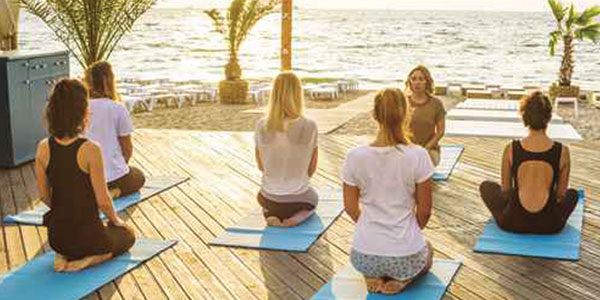 |
Nancy Kelly is a yoga teacher and personal trainer who teaches hatha, vinyasa, prenatal, restorative and children’s yoga. She |
| It wasn’t long ago that yoga was fairly uncommon and hard to find. It seems that in the past few years there has been enormous growth in the number of yoga classes offered at gyms, health centers and yoga studios. In addition, there are now many different styles available to meet the needs of a wide range of students. This is good news for anyone looking to begin or expand their yoga practice. Many people come to yoga classes because of the physical benefits of the practice which include increased strength and flexibility. However, there are other styles of yoga that focus more on stillness, relaxation and meditation, two of which are Yin and Restorative yoga. These types of classes can benefit all populations but are especially helpful to anyone with physical limitations, health concerns or those looking to reduce stress in their daily lives. If you have ever taken a yoga class, you might be familiar with a restorative pose called savasana that is held for several minutes at the end of class. Many students look forward to that time and enjoy the sense of peace that they feel when they leave. Yin and Restorative yoga offer an opportunity to experience that type of relaxation but on a deeper level. Both practices focus on body awareness and breathing techniques, however, they differ in purpose and intention. YIN CLASSES: A series of floor postures held for several minutes to strengthen and nourish joints and connective tissues. Poses may feel challenging and students are asked to breathe through any discomfort. Props such as bolsters, blankets and blocks can be used but are not required. Benefits of this practice are increased strength and mobility in the pelvis, hips and spine, as well as a sense of relaxation. RESTORATIVE CLASSES: Floor poses held longer with the purpose of stimulating the parasympathetic nervous system, or relaxation response. Props are used to support and nurture the body both underneath for comfort and on top for a sense of grounding. Teachers offer hands on assists and essential oils to promote a complete relaxation experience. Benefits of this practice are muscle and joint rejuvenation, mental clarity and an overall sense of well-being. I would encourage anyone to try either of these styles of yoga as a way to begin or expand your yoga practice. |
|













 20 lucky winners will win $500 each in prizes totaling $10,000.
20 lucky winners will win $500 each in prizes totaling $10,000. 